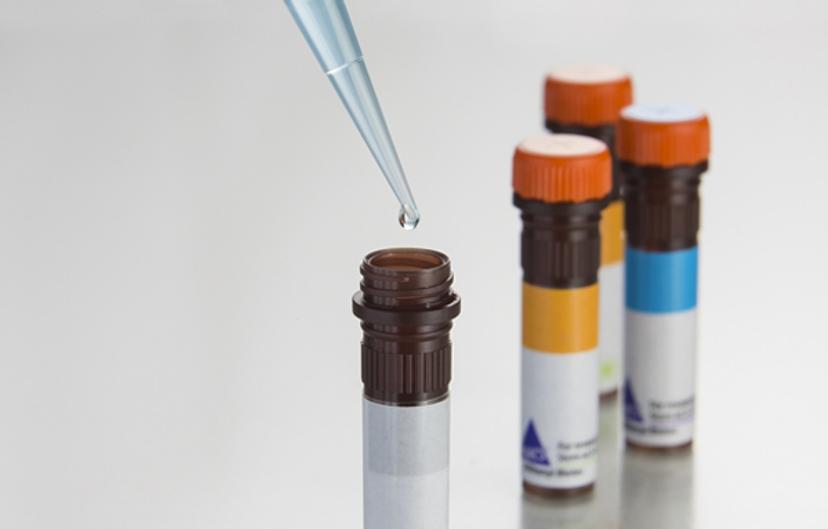How to Overcome Reproducibility Issues in Flow Cytometry
Discover why recombinantly engineered REAfinity Antibodies offer improved consistency, reproducibility and purity over traditionally produced monoclonal antibodies
11 Apr 2017

Kalpana Singh, Ph.D., Global Product Manager, Miltenyi Biotec Miltenyi Biotec Miltenyi Biotec develops and manufactures a portfolio of outstanding products, ranging from unique cell labeling reagents, through sophisticated cell separation and analysis devices, to innovative systems for clinical applications.
These antibodies are consistent in their structure and performance, leading to high experimental reproducibility
Kalpana Singh, Ph.D. Miltenyi Biotec
REAfinityTM Antibodies have been recombinantly engineered to produce highly specific antibodies that require no FcR blocking step. SelectScience spoke to Kalpana Singh, Ph.D., Global Product Manager, Miltenyi Biotec, to find out what specific advantages these recombinant antibodies offer over other monoclonal antibodies for flow cytometry.
SS: Kalpana, could you start by providing us with an overview of your main job responsibilities?
KS: My main tasks include management of the antibody development pipeline; building and maintaining strategic collaborations, such as with the GBSI Antibody Validation Working Group; planning and executing global marketing campaigns.
Reproducibility challenges in flow cytometry
SS: What challenges are currently facing the flow cytometry community?
KS: Like other techniques that rely on antibodies as detection reagents, flow cytometry suffers from reproducibility issues, due to the limited capabilities of traditional monoclonal antibodies.
Not being able to reproduce a scientific result can be frustrating, demotivating and in the long-term can have strong financial implications. The cumulative waste of time and money, of labs around the world trying and failing to reproduce results from other labs, publications and colleagues, can significantly hamper the credibility of the lab. This may eventually lead to grant organizations spending less money on either a particular set of research topics or on whole laboratories.
Since basic research is also the basis of clinical and pharma product development, irreproducible research can significantly delay this transition from bench to bedside. Recent publications have highlighted the critical role of antibodies in irreproducible research. Current manufacturing systems that produce polyclonal antibodies from serum, or monoclonal antibodies from mouse hybridoma cell lines, are prone to inconsistencies and lead to variable results between lots.
Besides that, traditional flow cytometry antibodies have limitations such as non-specific binding to Fc gamma receptors on off-target cells and many different isotypes, which require a complex set of isotype controls. Managing these limitations requires additional working steps that can be costly and time-consuming.
SS: How do the REAfinity™ Antibodies help researchers to address these issues?
KS: Mouse monoclonal antibodies produced in hybridoma cell lines often contain mixtures of different IgG heavy and light antibody chains. This impurity can lead to lot-to-lot variations and could impact the reproducibility of experiments. Recombinant antibodies, such as the REAfinity™ Antibodies, are derived from a defined genetic sequence and are generated in vitro. Sources of the antibody-encoding gene are either antigen-stimulated B cells or hybridomas, the latter of which are an excellent source of monospecific antibodies. Alternatively, the gene sequence is generated synthetically. The antibody-specific gene is then cloned into a high-expression vector. Subsequently, the antibody is produced in a suitable expression system such as mammalian cells. Therefore, these antibodies are consistent in their structure and performance, leading to high experimental reproducibility.

Hundreds of REAfinity specificities are available; choose from a variety of fluorochromes to address your multicolor flow needs
In summary, REAfinity Antibodies offer several major advantages over mouse monoclonal antibodies for long term studies:
- REAfinity Antibody products contain only one heavy and one light chain for higher lot-to-lot consistency.
- The unmatched quality of REAfinity Antibodies also arises from its manufacture in mammalian cells and production under a highly controlled manufacturing process.
- Compared to the average mouse monoclonal antibody, REAfinity Antibodies offer greater purity and higher lot-to-lot consistency, to make REAfinity Antibodies the reagent of choice.
Time and cost savings
SS: What other practical advantages do these flow cytometry antibodies offer over antibodies available on the market?
KS: Since the gene sequence of a recombinant antibody is known, it is easy to modify the sequence to improve the properties of the antibody. For example, REAfinity™ Antibodies from Miltenyi Biotec are engineered to lack binding to Fcγ Receptors; they have specifically mutated human IgG1 Fc regions. These mutations virtually eliminate non-specific binding to Fcγ receptors, resulting in a higher signal specificity during cell analysis and no need for Fc Receptor blocking steps.
Additionally, the antibodies all have the same IgG1 isotype. The result is that you need only one type of isotype control for all REA clones, named REA Control Antibodies. This results in:
- Significant cost savings since only one control is required.
- Time saved searching for the antibody isotype.
SS: In what fields are REAfinityTM Antibodies being used currently?
KS: REAfinityTM Antibodies are being used for flow cytometry for all sorts of applications in the fields of immunology, stem cell, cancer, cardiovascular, neuroscience, and exosome research.
SS: What does the future hold for recombinant antibodies for use in flow cytometry?
KS: With more than 7,000 REAfinity™ Antibodies, Miltenyi Biotec already has the largest recombinant antibody portfolio for flow cytometry in the market. With up to 200 new products being released every month, it is also the most rapidly growing portfolio in the market, giving researchers the flexibility they need.
We also recently decided to introduce the highest flow cytometry antibody titer available, in order to meet the demands for antibody panels that involve exceptionally high numbers of colors. Within the next months we are converting our portfolio to this new titer.
In addition to this, we are proud to have the opportunity to contribute our expertise to the establishment of guidelines in antibody validation, in the framework of the “Antibody Validation Workshop” by the GBSI.
